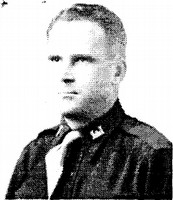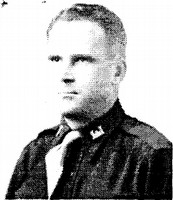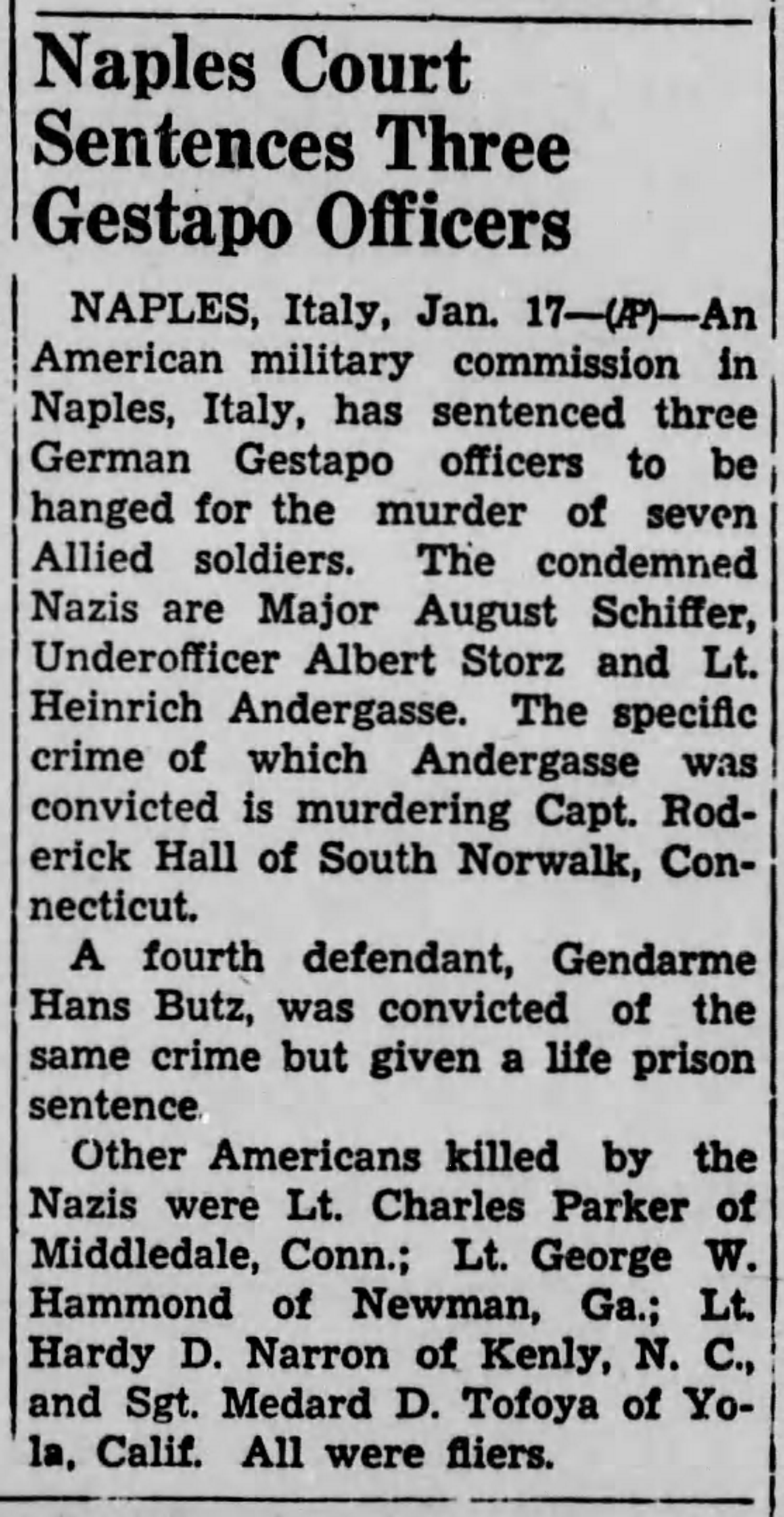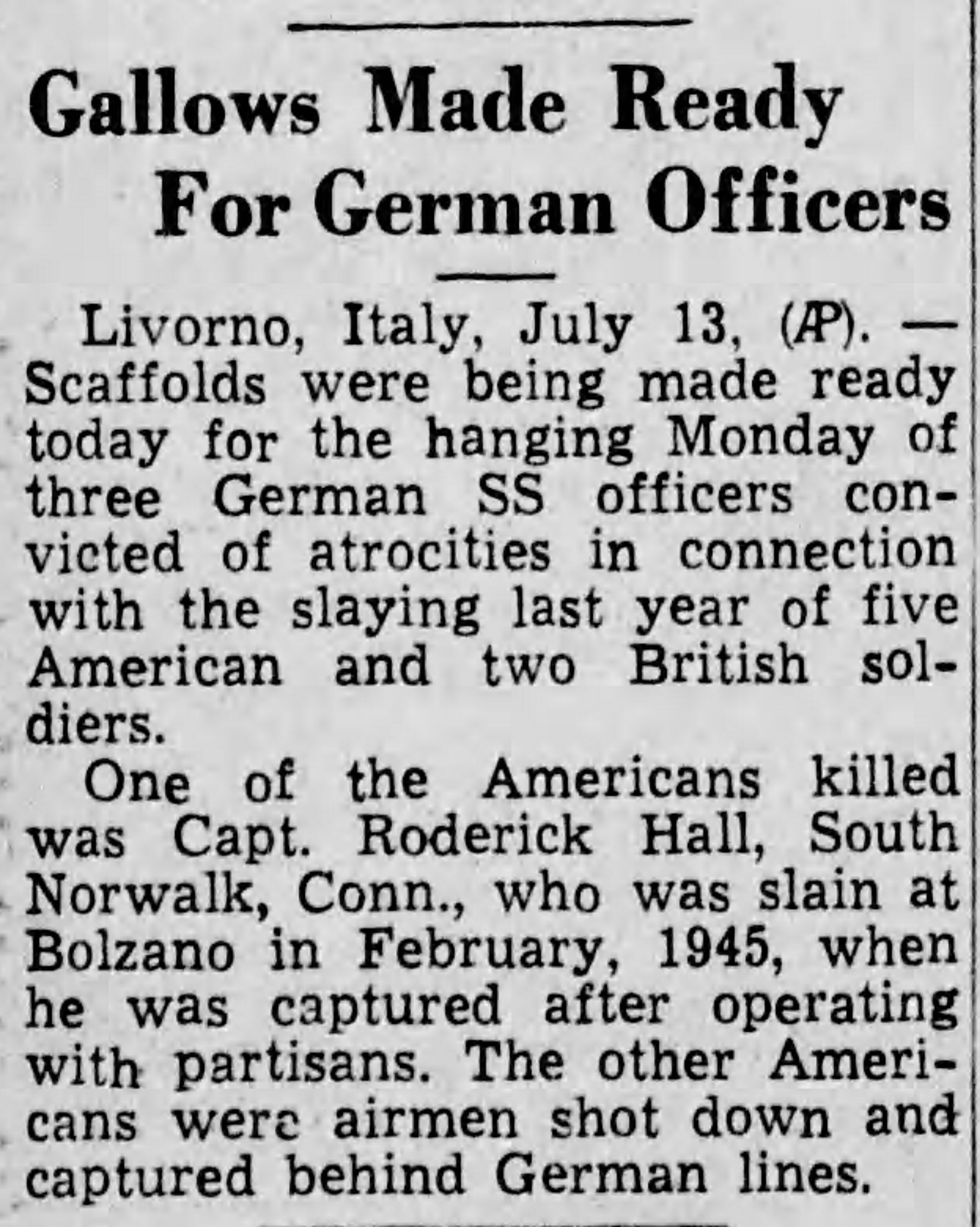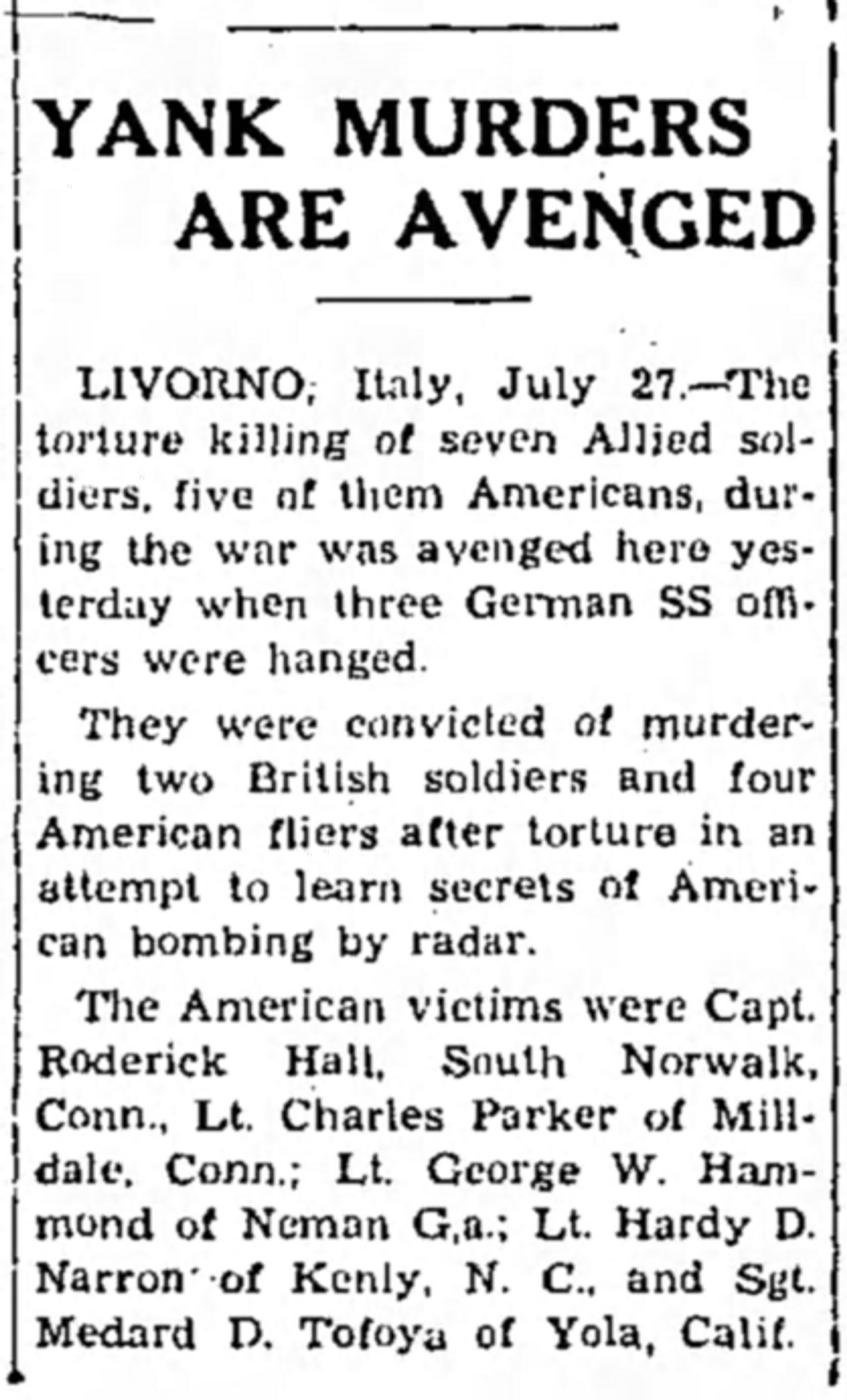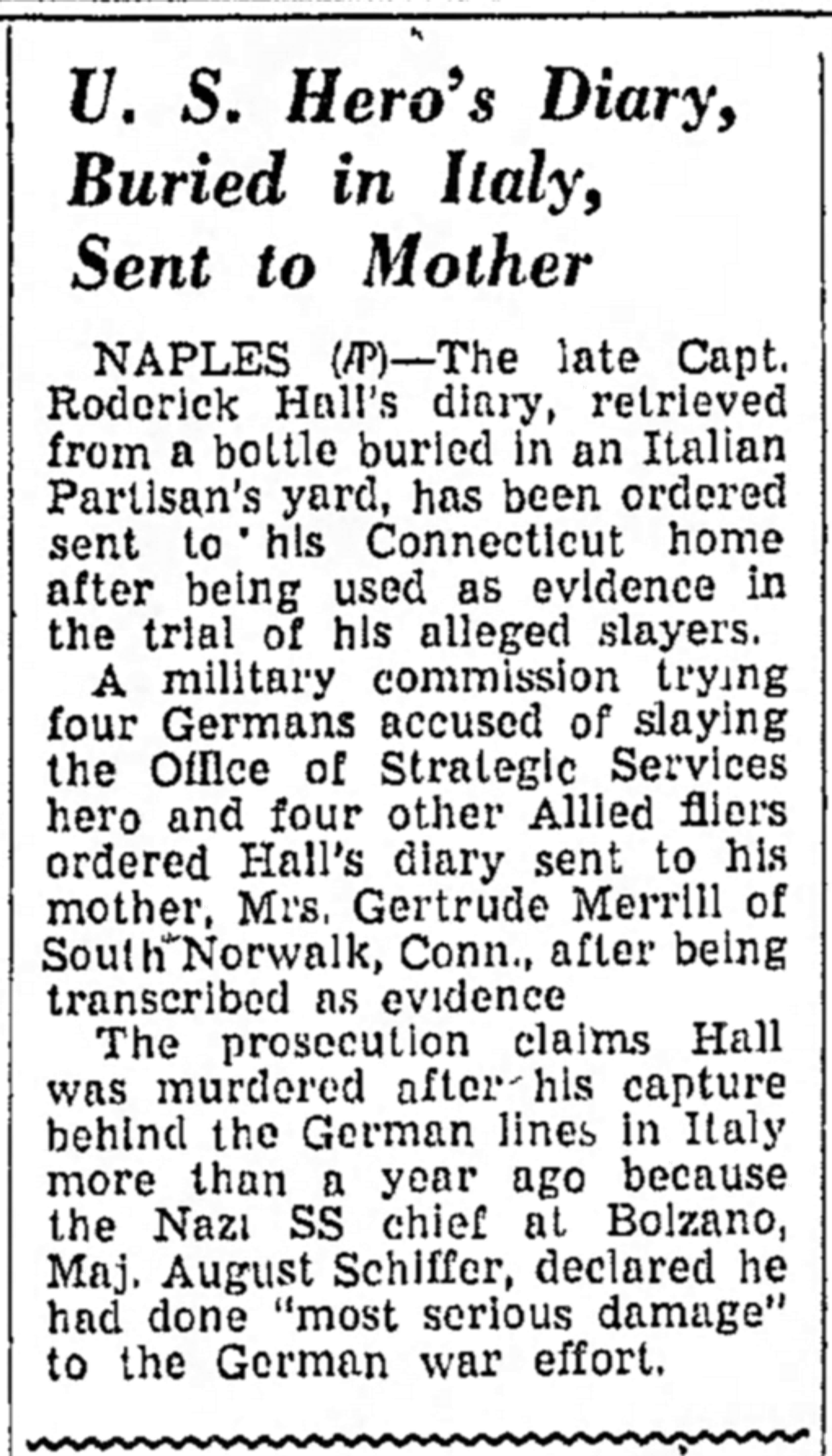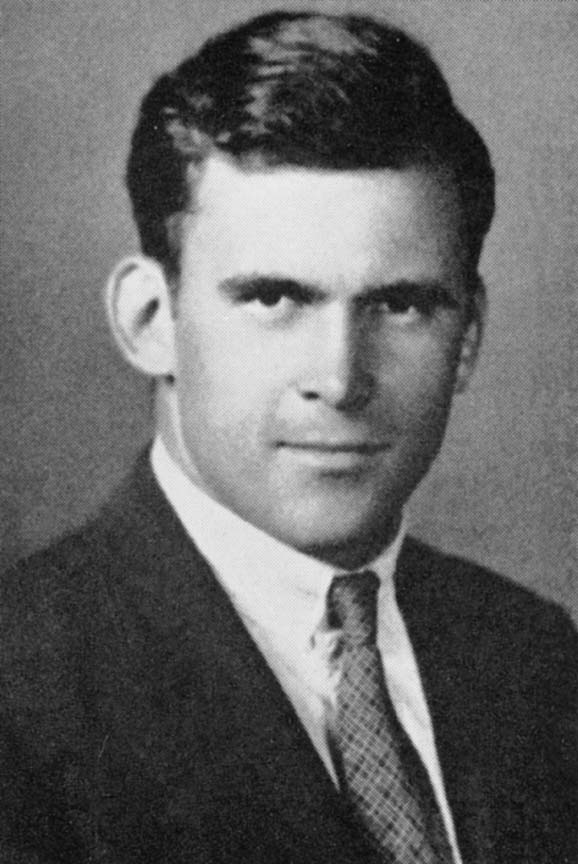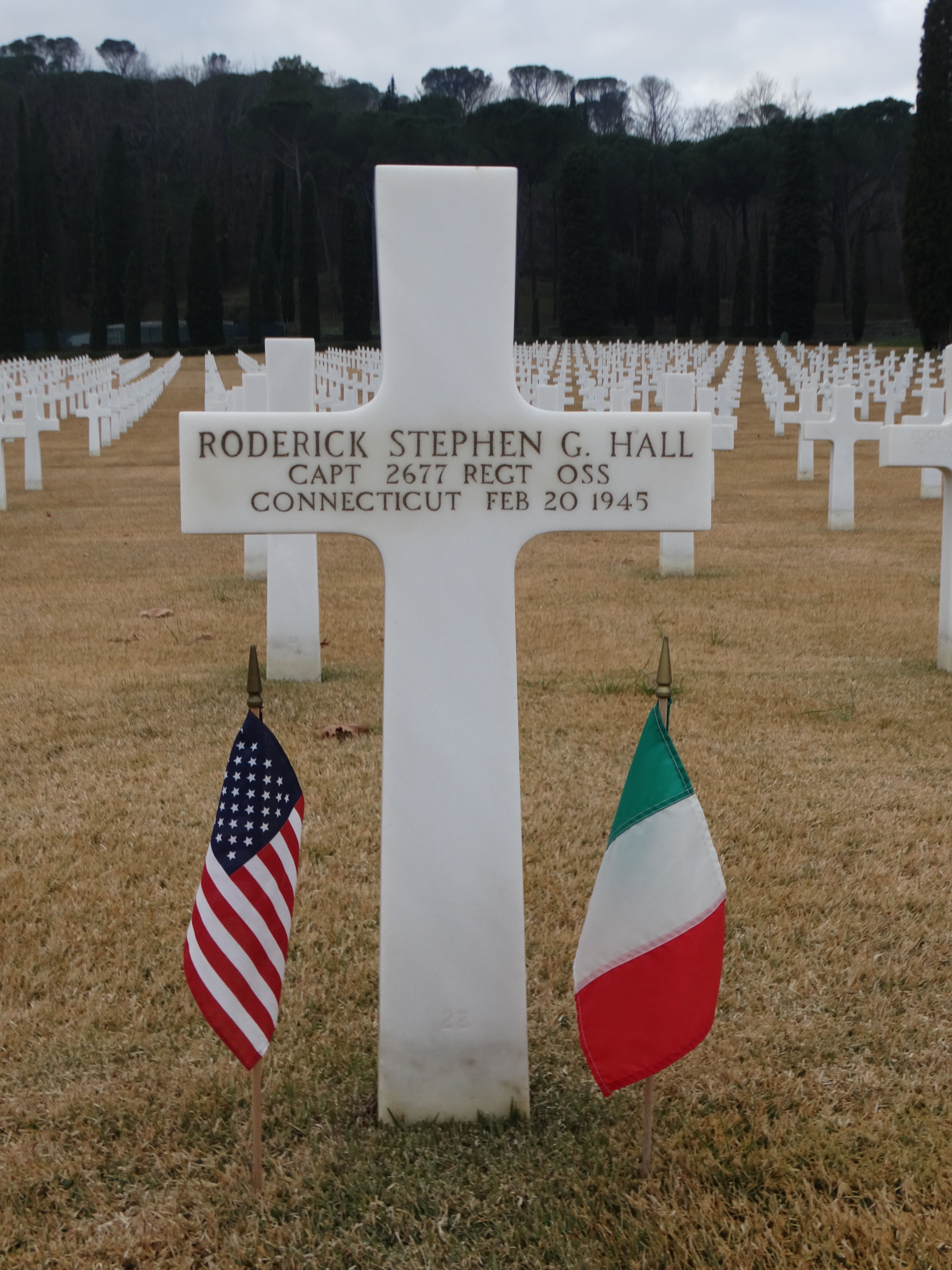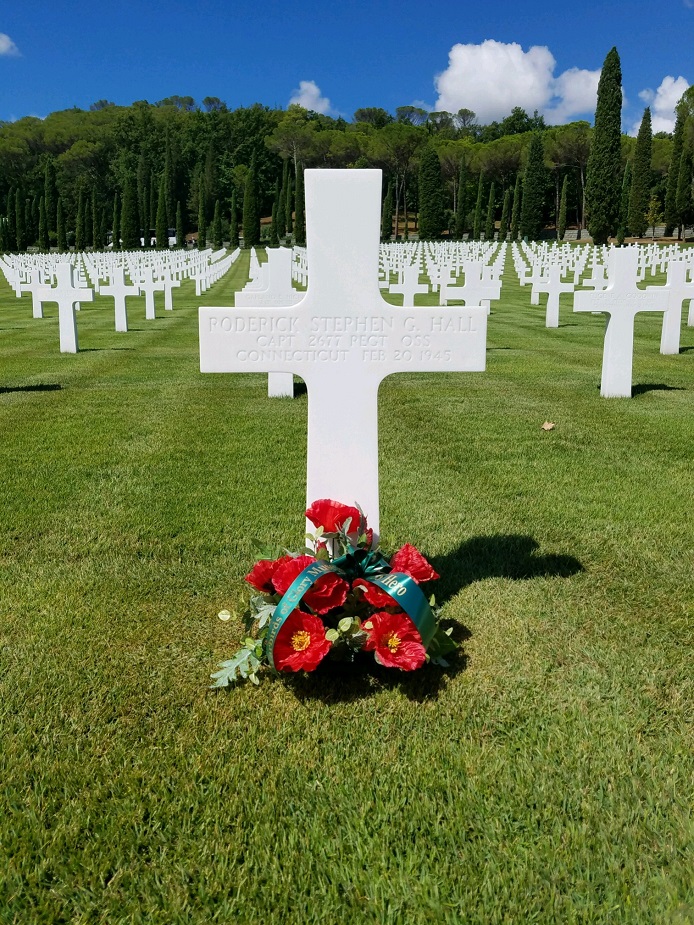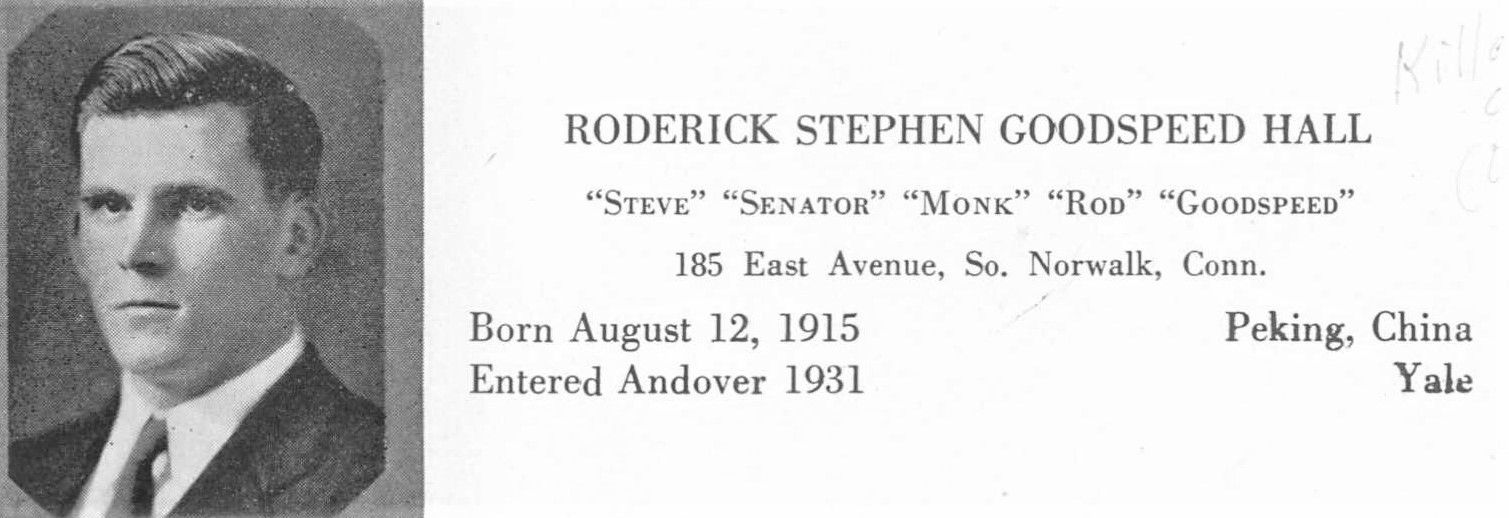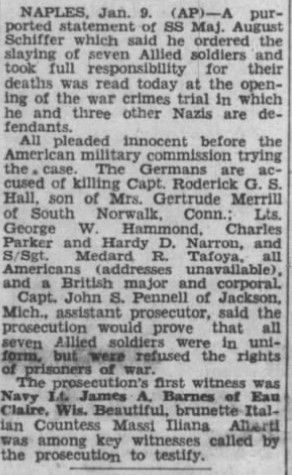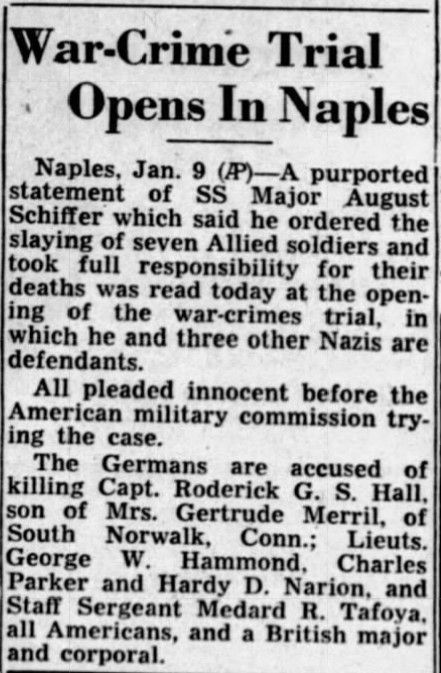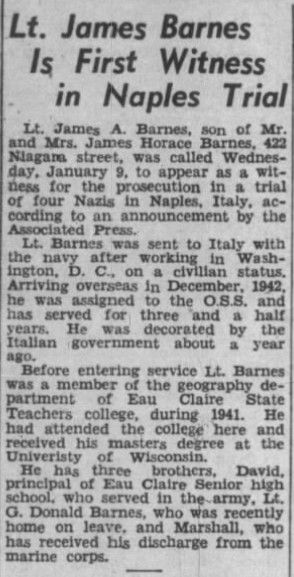Capt Hall was an OSS operative in WWII (the OSS was the predecessor to the CIA)
There is a good deal of information regarding Capt Hall on this link to the CIA website:
C.I.A.: Center for the Study of Intelligence
*HALL, RODERICK S. G. (KIA)
Synopsis:
The President of the United States takes pride in presenting the Distinguished Service Cross (Posthumously) to Roderick S. G. Hall (0-1114150), Captain (Corps of Engineers), U.S. Army, for extraordinary heroism in connection with military operations against an armed enemy while serving with Company D, 2677th Regiment, Office of Strategic Services, in action from 2 August 1944 to 27 January 1945, in Italy. Volunteering for a special mission into enemy-occupied territory, Captain Hall parachuted into the region southeast of the Brenner Pass on 2 August 1944 for the purpose of disrupting enemy communications routes. Remaining as a lone allied officer in this mountainous area and repeatedly exposing himself to capture by an enemy constantly seeking him, he interrupted communications, collected and relayed intelligence information, demolished enemy installations and facilities and organized and operated with partisan bands intent on inflicting the utmost damage to the hostile occupying forces. Constantly eluding capture and frequently exposed to the severe winter weather, he was reported to have been wounded twice and to have seriously frozen his feet during his gallant missions. Captain Hall's intrepid actions, personal bravery and zealous devotion to duty at the cost of his life, exemplify the highest traditions of the military forces of the United States and reflect great credit upon himself, his unit, and the United States Army.
Department of the Army, General Orders No. 85 (September 25, 1951)
Home Town: Fairfield County, Connecticut
Personal Awards: Distinguished Service Cross (WWII), Legion of Merit, Purple Heart
Thank you to contributor StratasFan (#47707286) for the following:
RODERICK STEPHEN GOODSPEED HALL, '34
Captain, CE, AUS, OSS
Legion of Merit, Purple Heart
RODERICK STEPHEN GOODSPEED HALL, agent of the OSS and leader of the American Mercury Eagle Mission into German-occupied Italy, lived a career of extraordinary bravery and achievement before he was murdered by S.S. troops on February 20, 1945.
After graduating from Andover, where he was Second Prizeman in Latin and arranger of stage settings for several plays, he went on to Yale. Always an individualist, he left college after one year, shipped out as able seaman on coastwise vessels, spent a year at Harvard, and then left late in 1937 for an extended skiing trip in the Dolomites.
On September 8, 1941 he entered the Army as a Private with the First Training Battalion at Camp Wheeler, Georgia, was transferred to the Fourth Motorized Division at Camp Gordon, Georgia, where he was assigned to Military Intelligence, Twelfth Infantry Division. Winning promotions to Acting Staff Sergeant, he was given the special assignment of writing a History of the U.S. Twelfth Infantry Regiment, 1798-1942.
During the winter of 1942, he used the information gathered on his skiing trip in Italy to submit to the War Department a report on Cortina d'Ampezzo, revealing the possibilities of espionage in that area, receiving commendations from VII Corps and the Second Army. Appointed to Officer Candidate School in February 1943, he received his commission in the Combat Engineers and was assigned to the 270th Engineer Combat Battalion, 70th Infantry Division, later teaching the Division an advanced course in Map and Camouflage.
His application to join the Office of Strategic Services was accepted in December 1943, and during that winter he worked steadily on detailed plans for his projected OSS work behind enemy lines in northern Italy. Going overseas as First Lieutenant on March 30, 1944, he served as demolition expert and chief instructor in the OSS training school at Chrea, Algeria, later flew all over Italy and along the entire length of the battle line, and in July reported himself almost ready for his special mission. As final preparation he attended a British Parachute School, winning his British Parachute Insignia as well as the American Silver Parachute Wings.
With the inception of the American Mercury Eagle Mission the story of his adventures is one of the incredible exploits of the war. With four other men he was dropped by parachute behind the German lines near Clauzetto, the Udine, with the task of organizing partisan bands and blowing up bridges, railroads and highways to disrupt enemy communications on the routes from Austria through the Alps to Italy. There he organized 1600 square miles of Alpine territory, distributed arms to partisans and formed six battalions and four intelligence networks, and secured for the Allies detailed information of the fortifications of the Alpine Line, the positions of Nazi headquarters and materiel dumps in the Alps, and a complete map of planned German defenses of the Brenner Pass.
During severe winter weather in 1944 he froze both feet while crossing a high mountain pass in deep snow, suffered extreme hardships of cold and starvation, and was forced to go into hiding in the tiny village of Andrich di Vallada and later in the forest of Todesch di Vallada. About to lie low until the end of the war, he set off under orders on January 25, 1945 in a blinding snowstorm to blow up the hydroelectric plant in Cortina. Very early the next morning a game warden found him in the forest outside Cortina d'Ampezzo with both feet so frozen and swollen that he could neither complete the mission nor escape. Promising help, the warden informed the Fascist police who had him identified by one of Hall's own partisans. He was taken to Verona and then to Bolzana where S.S. officers tortured him for two weeks before hanging him from a steam pipe in the torture room. Since Hall was in parachute uniform this deliberate murder was in direct violation of the Geneva Convention on prisoners of war. In January 1946 the four officers accused of his murder were tried before an American Military Commission in Naples. One was sentenced to life imprisonment; three were hanged.
Stephen's last letters to his mother and family were placed in bottles and buried in the snow in the Alps by a faithful partisan friend, Giovanni Andrich. His diary was hidden with Annetta, the kind woman who concealed him at such terrible risk to herself and her family. All the correspondence was subsequently sent to the United States.
For exceptionally meritorious conduct in the performance of outstanding services in Italy from 2 August 1944 to 27 January 1945, Captain Hall was posthumously awarded the Legion of Merit.
"Volunteering for a special mission into enemy occupied territory, for the purpose of interrupting enemy communication routes, Captain Hall parachuted into the region southeast of the Brenner Pass on August 1944 and remained there, as a lone allied officer, interrupting communications, collecting intelligence, and operating with partisans, during the course of which he was reported to have been twice wounded and to have frozen both feet, during severe winter weather, in high mountains. On January 7, 1945, while on his way to blow up the electric transformer station at Cortina d'Ampezzo and to interrupt the railway, he was captured by the enemy and subsequently died at the concentration camp on 20 February 1945. His unselfish devotion to duty and his unflinching courage in refusing to leave an area in which the enemy was seeking him, while he believed he could still damage the enemy, and in undertaking an extremely hazardous operation alone, were in keeping with the highest traditions of the Armed Forces of the United States."
No writing can portray more faithfully the loneliness and hardships, the outstanding courage and high sense of responsibility than can this young officer's own words. It is a fitting tribute to high ideals and gallantry far beyond the call of duty that excerpts from Captain Hall's diary and letters be included in this volume dedicated to the valiant men of Andover.
Capt Hall was an OSS operative in WWII (the OSS was the predecessor to the CIA)
There is a good deal of information regarding Capt Hall on this link to the CIA website:
C.I.A.: Center for the Study of Intelligence
*HALL, RODERICK S. G. (KIA)
Synopsis:
The President of the United States takes pride in presenting the Distinguished Service Cross (Posthumously) to Roderick S. G. Hall (0-1114150), Captain (Corps of Engineers), U.S. Army, for extraordinary heroism in connection with military operations against an armed enemy while serving with Company D, 2677th Regiment, Office of Strategic Services, in action from 2 August 1944 to 27 January 1945, in Italy. Volunteering for a special mission into enemy-occupied territory, Captain Hall parachuted into the region southeast of the Brenner Pass on 2 August 1944 for the purpose of disrupting enemy communications routes. Remaining as a lone allied officer in this mountainous area and repeatedly exposing himself to capture by an enemy constantly seeking him, he interrupted communications, collected and relayed intelligence information, demolished enemy installations and facilities and organized and operated with partisan bands intent on inflicting the utmost damage to the hostile occupying forces. Constantly eluding capture and frequently exposed to the severe winter weather, he was reported to have been wounded twice and to have seriously frozen his feet during his gallant missions. Captain Hall's intrepid actions, personal bravery and zealous devotion to duty at the cost of his life, exemplify the highest traditions of the military forces of the United States and reflect great credit upon himself, his unit, and the United States Army.
Department of the Army, General Orders No. 85 (September 25, 1951)
Home Town: Fairfield County, Connecticut
Personal Awards: Distinguished Service Cross (WWII), Legion of Merit, Purple Heart
Thank you to contributor StratasFan (#47707286) for the following:
RODERICK STEPHEN GOODSPEED HALL, '34
Captain, CE, AUS, OSS
Legion of Merit, Purple Heart
RODERICK STEPHEN GOODSPEED HALL, agent of the OSS and leader of the American Mercury Eagle Mission into German-occupied Italy, lived a career of extraordinary bravery and achievement before he was murdered by S.S. troops on February 20, 1945.
After graduating from Andover, where he was Second Prizeman in Latin and arranger of stage settings for several plays, he went on to Yale. Always an individualist, he left college after one year, shipped out as able seaman on coastwise vessels, spent a year at Harvard, and then left late in 1937 for an extended skiing trip in the Dolomites.
On September 8, 1941 he entered the Army as a Private with the First Training Battalion at Camp Wheeler, Georgia, was transferred to the Fourth Motorized Division at Camp Gordon, Georgia, where he was assigned to Military Intelligence, Twelfth Infantry Division. Winning promotions to Acting Staff Sergeant, he was given the special assignment of writing a History of the U.S. Twelfth Infantry Regiment, 1798-1942.
During the winter of 1942, he used the information gathered on his skiing trip in Italy to submit to the War Department a report on Cortina d'Ampezzo, revealing the possibilities of espionage in that area, receiving commendations from VII Corps and the Second Army. Appointed to Officer Candidate School in February 1943, he received his commission in the Combat Engineers and was assigned to the 270th Engineer Combat Battalion, 70th Infantry Division, later teaching the Division an advanced course in Map and Camouflage.
His application to join the Office of Strategic Services was accepted in December 1943, and during that winter he worked steadily on detailed plans for his projected OSS work behind enemy lines in northern Italy. Going overseas as First Lieutenant on March 30, 1944, he served as demolition expert and chief instructor in the OSS training school at Chrea, Algeria, later flew all over Italy and along the entire length of the battle line, and in July reported himself almost ready for his special mission. As final preparation he attended a British Parachute School, winning his British Parachute Insignia as well as the American Silver Parachute Wings.
With the inception of the American Mercury Eagle Mission the story of his adventures is one of the incredible exploits of the war. With four other men he was dropped by parachute behind the German lines near Clauzetto, the Udine, with the task of organizing partisan bands and blowing up bridges, railroads and highways to disrupt enemy communications on the routes from Austria through the Alps to Italy. There he organized 1600 square miles of Alpine territory, distributed arms to partisans and formed six battalions and four intelligence networks, and secured for the Allies detailed information of the fortifications of the Alpine Line, the positions of Nazi headquarters and materiel dumps in the Alps, and a complete map of planned German defenses of the Brenner Pass.
During severe winter weather in 1944 he froze both feet while crossing a high mountain pass in deep snow, suffered extreme hardships of cold and starvation, and was forced to go into hiding in the tiny village of Andrich di Vallada and later in the forest of Todesch di Vallada. About to lie low until the end of the war, he set off under orders on January 25, 1945 in a blinding snowstorm to blow up the hydroelectric plant in Cortina. Very early the next morning a game warden found him in the forest outside Cortina d'Ampezzo with both feet so frozen and swollen that he could neither complete the mission nor escape. Promising help, the warden informed the Fascist police who had him identified by one of Hall's own partisans. He was taken to Verona and then to Bolzana where S.S. officers tortured him for two weeks before hanging him from a steam pipe in the torture room. Since Hall was in parachute uniform this deliberate murder was in direct violation of the Geneva Convention on prisoners of war. In January 1946 the four officers accused of his murder were tried before an American Military Commission in Naples. One was sentenced to life imprisonment; three were hanged.
Stephen's last letters to his mother and family were placed in bottles and buried in the snow in the Alps by a faithful partisan friend, Giovanni Andrich. His diary was hidden with Annetta, the kind woman who concealed him at such terrible risk to herself and her family. All the correspondence was subsequently sent to the United States.
For exceptionally meritorious conduct in the performance of outstanding services in Italy from 2 August 1944 to 27 January 1945, Captain Hall was posthumously awarded the Legion of Merit.
"Volunteering for a special mission into enemy occupied territory, for the purpose of interrupting enemy communication routes, Captain Hall parachuted into the region southeast of the Brenner Pass on August 1944 and remained there, as a lone allied officer, interrupting communications, collecting intelligence, and operating with partisans, during the course of which he was reported to have been twice wounded and to have frozen both feet, during severe winter weather, in high mountains. On January 7, 1945, while on his way to blow up the electric transformer station at Cortina d'Ampezzo and to interrupt the railway, he was captured by the enemy and subsequently died at the concentration camp on 20 February 1945. His unselfish devotion to duty and his unflinching courage in refusing to leave an area in which the enemy was seeking him, while he believed he could still damage the enemy, and in undertaking an extremely hazardous operation alone, were in keeping with the highest traditions of the Armed Forces of the United States."
No writing can portray more faithfully the loneliness and hardships, the outstanding courage and high sense of responsibility than can this young officer's own words. It is a fitting tribute to high ideals and gallantry far beyond the call of duty that excerpts from Captain Hall's diary and letters be included in this volume dedicated to the valiant men of Andover.
Inscription
RODERICK STEPHEN G. HALL
CAPT 2677 REGT OSS
CONNECTICUT FEB 20 1945
Gravesite Details
Entered the service from Connecticut.
